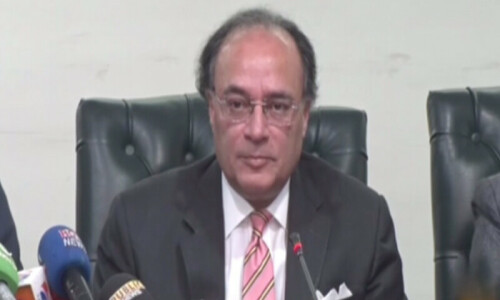ISLAMABAD: Pakistan and China signed on Monday agreements worth $28 billion to immediately kick-start ‘early harvest’ projects under the Pakistan-China Economic Corridor (PCEC).
A statement issued by the Planning Commission said that the remaining projects of $17bn would be carried out as soon as the required studies, processes and formalities were completed.
It said the ground-breaking and signing of financial agreements had demonstrated a strong will on both sides to implement the $45bn (other reports put the amount of investment at $46bn) portfolio agreed under the PCEC framework as early as possible to help Pakistan meet its energy needs.
The statement said the two sides had signed 51 agreements and memoranda of understanding (MoUs), inaugurated eight projects by unveiling plaques and performed ground-breaking of five projects. On top of the list were 16 MoUs and protocols and 25 framework agreements or terms sheets for which formal agreements would be signed later.
The $28bn financing agreements will immediately come into the implementation phase because necessary processes have already been completed. These include: 1000MW solar power park in Punjab; 870MW Suki Kanari (Khyber Pakhtunkhwa) hydropower project; 720MW Karot (AJK) hydropower project; three wind power projects at Thatta of United Energy Pakistan (100MW), Sachal (50MW) and Hydro-China (50MW); Chinese government’s concessional loans for the second phase upgradation of Karakorum Highway (Havelian to Thakot); Karachi-Lahore Motorway (Multan to Sukkur), Gwadar Port east-bay expressway project and Gwadar international airport; provision of material for tackling climate change; projects in the Gwadar Port region and establishment of China-Pakistan Joint Cotton Biotech Laboratory and China-Pakistan Joint Marine Research Centre.
An agreement for cooperation between the State Administration of Press, Publication, Radio, Films and Television of China and Pakistan’s Ministry of Information, Broadcasting and National Heritage and a tripartite agreement between China Central Television and PTV and Pakistan Television Foundation for rebroadcasting of CCTV-NEWS/CCTV-9 Documentary in Pakistan were also signed.
Protocol agreements were signed on establishment of sister-cities relationship between Chengdu (in China’s Sichuan province) and Lahore; Zhuhai (Guangdong province) and Gwadar and Karamay (Xinjiang Uyghur) and Gwadar.
Another agreement is about Gwadar-Nawabshah LNG terminal and pipeline project and commercial contract and agreements on financing for Lahore Orange Line Metro Train project, Port Qasim 2x660MW (1320MW) coal-fired power plant, Jhimpir wind power project, Thar Block II 3.8 million tons coal production per annum and Thar Block II 2x330MW (660MW) coal-fired power project.
A financing cooperation agreement was signed by China Development Corporation and Habib Bank Limited for implementation of the PCEC and an MoU between Wapda, PPIB and China Three Gorges Corporation (CTG) for cooperation in development of hydropower projects and Silk Road Fund on development of private hydropower projects.
A financing facility agreement was signed between Industrial and Commercial Bank of China (ICBC), PCC of China and HDPPL for Dawood wind power project and a framework agreement on financial services corporation between ICBC and HBL for promoting Chinese investments and development of industrial parks in Pakistan.
Planning and Development Minister Ahsan Iqbal said the PCEC would link Kashgar in western China with Gwadar Port through a mesh of communication networks comprising a world class seaport, commercial sea lines, an airport, highways, railways, fibre optic cables and oil and gas pipelines.
He said the corridor was part of a wider ‘one belt, one road’ strategy to develop China’s western region and link the Silk Route Economic Belt with the 21st century Maritime Silk Route.
“The corridor comprises modern highway and railway transportation system linking Kashgar with Khunjerab in the north and onwards to Karachi and Gwadar in the south of Pakistan through multiple routes,” he said, adding that the energy sector had been assigned top priority to help the country overcome energy shortages to achieve higher growth rates for speedy development.
“The corridor projects initially envisage $34bn investment in the energy sector and around $11bn in the infrastructure sector,” the minister said, adding that the two countries had finalised plans to add 10,400MW through early harvest energy generation projects spread across the country to be completed by 2017-18.
After completing the requisite regulatory and other facilitation requirements, the two sides have concluded financial close for 200MW wind power projects, 5,580MW coal-based power generation projects, 1,590MW hydropower projects, 1,000MW solar power and 3.8 tons per annum coal mining project, he said.
Published in Dawn, April 21st, 2015
On a mobile phone? Get the Dawn Mobile App: Apple Store | Google Play














































